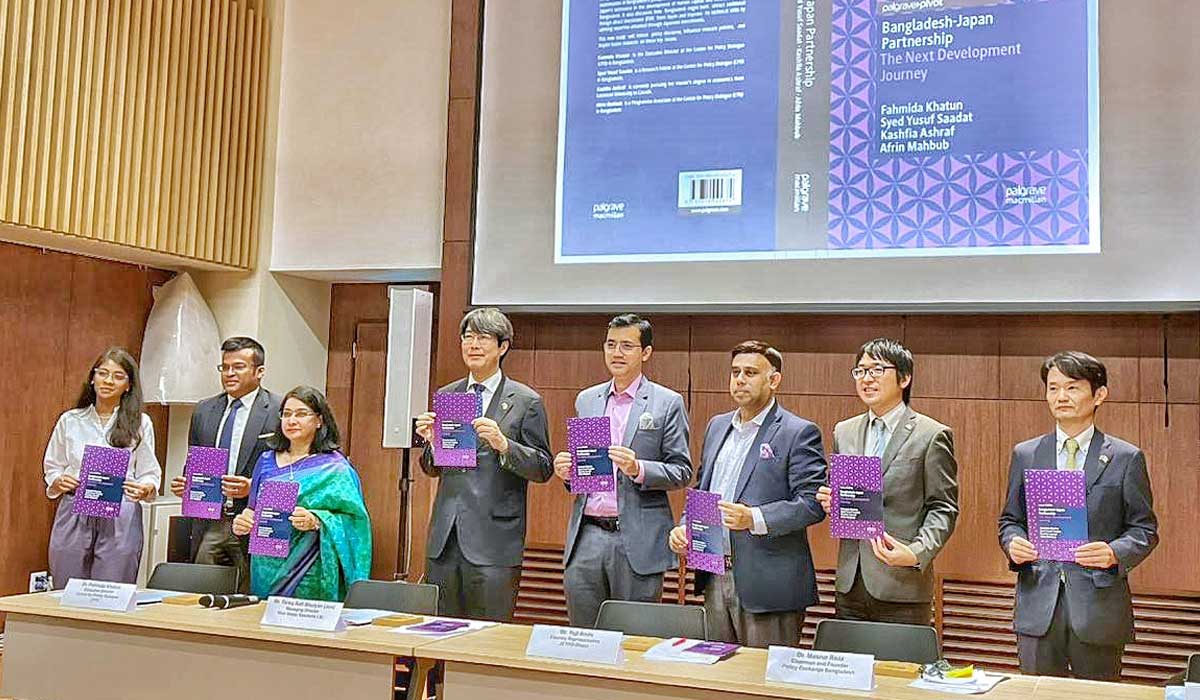
The Embassy of Japan in Bangladesh and the Centre for Policy Dialogue (CPD) co-organised a seminar on “Bangladesh-Japan Relationship: Trade and Investment” where Dr Fahmida Khatun, the Executive Director of CPD delivered a lecture on the potential of strengthening the bilateral relationship between Bangladesh and Japan, especially regarding trade and investment, and shared a summary of her experiences during her visit to Japan in February 2023. The seminar also included a soft launch of the forthcoming book to be published by Palgrave Macmillan titled “Bangladesh-Japan Partnership: The Next Development Journey”, co-authored by Dr Fahmida Khatun, Mr Syed Yusuf Saadat, Ms Kashfia Ashraf, and Ms Afrin Mahbub. The presentation delivered by Dr Khatun was part of a research study conducted by CPD in 2022 on the occasion of the 50 years relationship between Bangladesh and Japan. The study was conducted based on existing literature and interviews with Bangladeshi and Japanese experts and policymakers. Following Dr Khatun’s presentation, a panel discussion session was held, which was moderated by Mr Hiroki Haruta, First Secretary and the Head of the Economic Section of the Embassy of Japan in Bangladesh. The panel session also hosted four distinguished panel members including Dr Fahmida Khatun, Dr Masrur Reaz, Chairman and Founder of Policy Exchange Bangladesh, Mr Yuji Ando, Country Representative of JETRO Dhaka, and Mr Tareq Rafi Bhuiyan (Jun), Managing Director of New Vision Solutions Ltd.
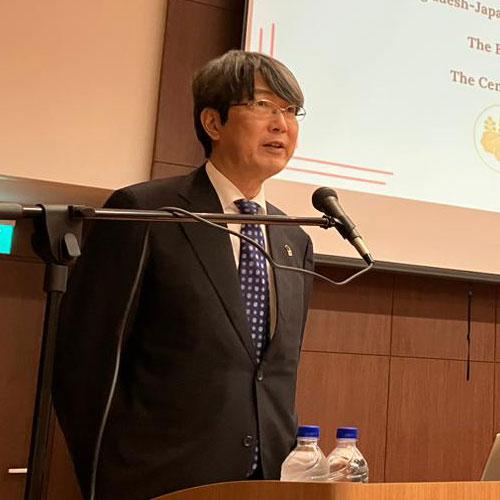
The introductory remarks for the seminar were delivered by His Excellency Mr. Iwama Kiminori, the Ambassador Extraordinary and Plenipotentiary of the Embassy of Japan in Bangladesh. He mentioned Dr Fahmida Khatun’s recent visit to Japan, where she engaged with prominent Japanese economists and Bangladeshis active in Japan. HE highlighted that one of the purposes of the seminar was to share Dr Khatun’s experiences and discuss ways to enhance the trade and investment relationship between Bangladesh and Japan. Given the successful visit of Bangladesh’s Prime Minister, last month, HE expressed the need to move forward and follow up on the discussions. HE emphasised that the seminar would discuss ways of improving the business environment in Bangladesh to attract more Japanese foreign direct investment (FDI) and explore the potential of an Economic Partnership Agreement (EPA) between the two countries. Furthermore, HE mentioned his pleasure to be part of the launching of forthcoming book titled “Bangladesh-Japan Partnership: The Next Development Journey”, co-authored by Dr Fahmida Khatun, Mr Syed Yusuf Saadat, Ms Kashfia Ashraf, and Ms Afrin Mahbub adding to the significance of the event.
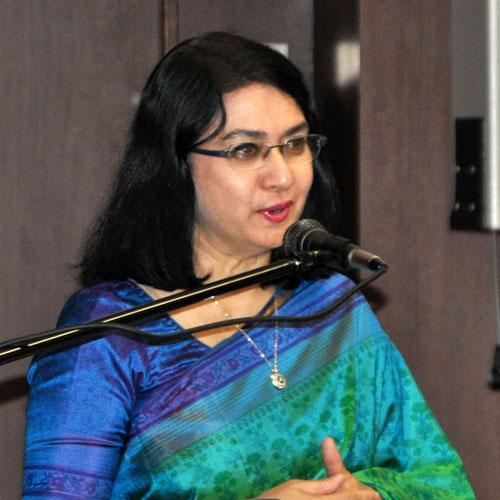
In her opening remarks, Dr Fahmida Khatun, Executive Director of Centre for Policy Dialogue (CPD) briefly spoke about her visit to Japan where she met with Japanese experts and policymakers from the government to understand how the relationship between Bangladesh and Japan could be taken forward. She mentioned that the partnership between Japan and Bangladesh has been tested over the last five decades but now the new era is approaching and thus the nature of the relationship needs to evolve. Dr Khatun highlighted that cooperation between two countries is not only limited to trade and investment but also includes health, education, and people-to-people collaboration and many other aspects. However, these other aspects will follow if trade and investments are expedited. Dr Khatun recalled that Bangladesh and Japan established diplomatic ties in 1972, but their relationship went back even before Bangladesh gained independence. Currently, Bangladesh is undergoing a double transition, aiming to move from a low-income country to a lower middle-income country and from a least-developed country to a developing country. It also faces challenges posed by the Fourth Industrial Revolution. Japan, as Bangladesh’s major bilateral development partner, has been actively collaborating on infrastructure development, industrialisation support, healthcare and education accessibility, and vulnerability reduction.
Since Bangladesh’s independence, trade with Japan has shown improvement despite fluctuations. In the early years, a large share of Bangladesh’s exports to Japan was due to lower overall export volumes. However, recent times have seen a significant increase in Bangladesh’s exports to Japan, particularly in the ready-made garment, leather, footwear, and textile sectors. Imports from Japan, including vehicles, machinery, electronics, and iron and steel, have also risen. While the volume of exports has increased, the share of exports in the overall trade has declined. Both Bangladesh and Japan have untapped potential for trade, with Bangladesh having the opportunity to export additional cotton t-shirts, vests, trousers, and shorts, and Japan having the potential to export more machinery.
Policies such as the Comprehensive Economic Partnership Agreement (CEPA) and Japan’s provision of a Generalised System of Preferences (GSP) have facilitated bilateral trade and economic cooperation. However, with changes in the global trade regime, bilateral agreements are becoming more important. Bangladesh needs to sign a bilateral trade agreement with Japan to secure investment and trade benefits, as high Most Favoured Nation (MFN) tariffs may be imposed on Bangladeshi products after LDC graduation, affecting competitiveness in the international market.
Despite fluctuations, investment in Bangladesh has been increasing, reaching USD 123 million in 2022. The top five sectors attracting FDI as of June 2022 included fertilisers, construction, textile and clothing, power, gas and petroleum. However, there are barriers to FDI in Bangladesh, particularly related to the high cost of doing business, which hampers the country’s business environment and competitiveness. This leads to higher initial investment costs, creating challenges for attracting foreign investors. To promote investment, a Japanese Economic Zone is being constructed in Araihazar, Narayanganj, with an expected completion by 2030. Companies operating in the economic zone will enjoy tax exemptions, income tax immunity on 50 per cent of export earnings, duty-free exports, cash incentives, bonded warehousing facilities, and duty drawback. Basic healthcare facilities will also be available in Narayanganj.
Despite the benefits, there are challenges with the economic zone. Its proximity to the river creates transportation and network connectivity issues, lacking direct access to the highway, which may deter Japanese investors. Additionally, the distant Chittagong seaport increases supply chain costs for imports, posing a hurdle for foreign investors. However, there are plans to develop better infrastructure for improved connectivity. The economic zone has significant potential, with an estimated creation of a maximum of 61,330 jobs and up to 128 industrial units by 2034.
To strengthen the Bangladesh-Japan relationship, foreign policy and bilateral trade agreements can be pursued. This will enhance market accessibility, providing Duty-Free Quota-Free (DFQF) access to the Japanese market, benefiting both countries. The BIG-B initiative can also bolster development cooperation between Bangladesh and Japan. In post-LDC graduation, higher tax regimes pose a challenge for Bangladesh. To mitigate this, Japan can offer a grace period of at least three years with continued tariff flexibility and eligibility for GSP+. Bangladesh should also prepare to meet the criteria for GSP+ facilities. The agriculture sector holds potential for collaboration, while the healthcare sector offers opportunities due to Japan’s ageing population and Bangladesh’s young demography. Bangladesh should focus on skill development and trade in services to cater to Japan’s caregiving needs. Despite conducive investment policies in Bangladesh, Japanese investors face challenges such as unclear guidelines, inappropriate business environment, complex repatriation processes, complicated customs procedures, delays in shipments, lack of skilled IT professionals, poor internet connectivity, and complicated foreign exchange regulations. Mutually beneficial partnership opportunities exist between Bangladesh and Japan, particularly as Bangladesh undergoes critical transitions towards becoming a developing and upper-middle-income country. Support from partners like Japan is crucial during this phase, including technological transfer, skill development, and infrastructure improvement to attract foreign investments.
In conclusion, Bangladesh has found Japan to be an exceptional development partner, displaying unparalleled dedication, quality, and sincerity in their relationship. Dr Khatun further added that the experience of interacting with Japanese experts and policymakers has revealed a humble and polite yet focused and sincere approach. Japan’s cultural blend of East and West, along with its high level of development and rich cultural values, resonates well with Bangladesh. Her trip provided an excellent opportunity to discuss collaborative efforts and explore avenues for cooperation. Impressively, Japanese libraries even house physical copies of Bangladeshi books, reflecting the positive impression Japan holds of Bangladesh.
During the panel discussion, Dr Khatun stressed the importance of skills development, as well as addressing the pressing issue of climate change in Bangladesh. Bangladesh is highly vulnerable to the impacts of climate change and is making investments to transition from fossil fuel-based energy systems to renewable energy sources, aligning with the global shift towards clean energy. The country has voluntarily committed to the Nationally Determined Contributions (NDC) to reduce carbon emissions. To ensure market access and compliance with environmental regulations, Bangladesh needs to establish a clean and green production system, particularly as stringent environmental compliance measures are expected after its graduation in 2026. She highlighted the European market’s introduction of carbon border adjustments, which requires exporters to disclose the carbon content of their products, creating a trade barrier that necessitates preparation and investment. Japan is involved in energy planning and has targets for clean energy investment, presenting opportunities for business collaboration. Additionally, the private sector can explore nature-based solutions for adaptation, which can also be financially viable investments.

Dr Masrur Reaz, Chairman and Founder, Policy Exchange Bangladesh, mentioned that Japan’s engagement with Bangladesh was primarily driven by the pull factor from the Japanese side, while Bangladesh had high hopes and expectations. Japan, being an advanced economy with a longstanding presence in the region, understood the trade and investment opportunities that Bangladesh offered. Several factors contributed to Japan’s strong interest in Bangladesh. Firstly, Bangladesh has a solid long-term growth prospect, with a higher average growth rate than Vietnam and other low-middle-income countries. The country’s projected average growth rate until 2030 is also promising. Bangladesh’s demographic dividend, with a large working-age population, provides a basis for efficient investment and access to a growing consumer market. The country’s digital readiness, including internet connectivity and a skilled labour pool, along with its cost competitiveness, further enhance its appeal. Additionally, the significant infrastructure investment required in Bangladesh presents opportunities for collaboration. While progress has been made in systematic investment promotion, Bangladesh still has a long way to go in matching the pull factor with its own push factor.
Furthermore, Dr Reaz emphasised two key areas of concern for Bangladesh. Bangladesh needs to move away from its previous ad hoc general investment promotion practices. This may have been effective in the past but is unlikely to work in the future on the scale required for Bangladesh to achieve the level of sophistication seen in Japan. Instead, Dr Reaz proposed utilising more strategic approaches, such as regional economic cooperation or marketing integration initiatives. He highlighted the example of the BIG-B project, a development that can create an economic corridor catering to regional markets like India, Bhutan, and Nepal. By taking advantage of such opportunities, Bangladesh can attract more investment from Japanese companies, not only in infrastructure but also in manufacturing services and logistics. Secondly, Bangladesh should adopt an integrated trade and investment approach. Bangladesh lacks a national trade strategy or policy, despite having separate export and import policies. A comprehensive national trade strategy would provide complementary investment directions and enable the establishment of economic partnerships and free trade agreements (FTAs).
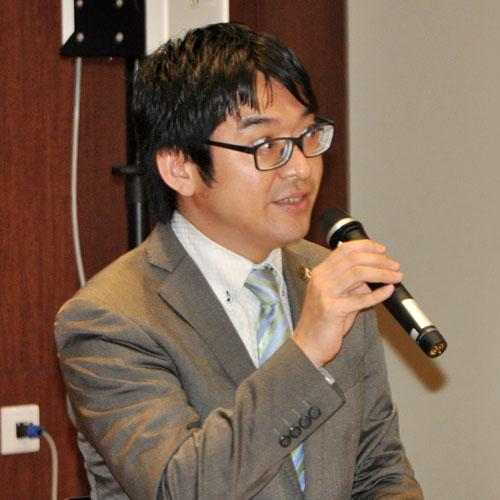
In the discussion, Mr Yuji Ando, Country Representative of JETRO Dhaka, highlighted several important factors for Bangladesh to achieve cost competitiveness and increase exports, particularly to Japan. Firstly, he highlighted the significance of a free trade agreement (FTA) or economic partnership agreement (EPA) to compensate for the loss of the Generalised System of Preferences (GSP+) facilities after Bangladesh’s graduation from the Least Developed Country (LDC) status. He asserted that a trade agreement is crucial to maintain cost competitiveness. Secondly, he emphasised the need for diversification in Bangladesh’s export basket. Japanese companies are seeking to diversify their supply chains, including sourcing from Bangladesh. To facilitate this diversification and expand the export basket, he suggested developing platform industries and procuring raw materials domestically to reduce costs. The third important factor highlighted was the improvement of the business environment. Mr Ando mentioned the high costs associated with letter of credit (LC) settlements for imports and the need for digitalisation and transparency in customs procedures. He argued that improving the business environment, including the banking sector, is crucial for attracting more investment and promoting exports. Furthermore, he stressed the importance of a comparative perspective, urging the Bangladesh government to assess the business environment and learn from ASEAN countries, which serve as competitors to Bangladesh in terms of attracting investment and improving business conditions. By addressing these factors, Bangladesh can reduce production costs, enhance competitiveness, and promote greater investment and export activities.
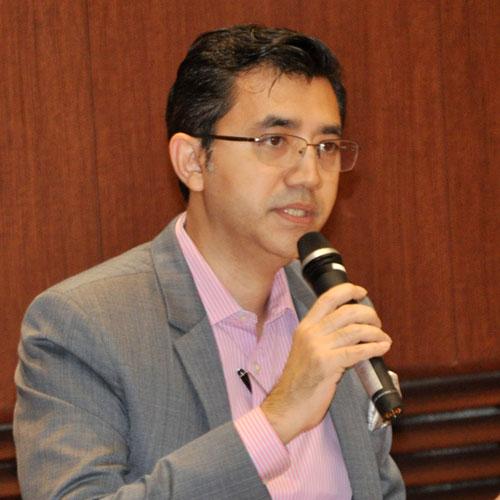
In the discussion, Mr Tareq Rafi Bhuiyan (Jun), Managing Director of New Vision Solutions Ltd, recalled the findings of a JETRO survey conducted in 2022, which revealed that Japanese companies are interested in expanding their business in Bangladesh, ranking it second among their preferred destinations. However, the survey also identified challenges, with 67 per cent of respondents citing a lack of skilled labour as a major issue. The upcoming Japanese Economic Zone at Araihazar is expected to create around 60,000 jobs, and hence there is a need for Bangladesh to address the skilled labour force deficit urgently. To tackle this issue, he suggested following the example of the neighbouring country India, which established the Japan Institute of Management (JMI) in collaboration with Japan’s Ministry of Economy, Trade, and Industry (METI) and the Ministry of Skill Development and Entrepreneurship in India. The JMI aims to train 30,000 engineers over the next decade. A similar approach should be adopted in Bangladesh, not only focusing on technical skills but also on soft skills and work culture that are essential for Japanese companies. While there are positive initiatives such as the Japanese studies department at Dhaka University and organisations like B-JET, Bangladesh’s government needs to enhance vocational institutes’ training programs to develop a more skilled and disciplined workforce for Japanese companies.
Mr Bhuiyan also highlighted the importance of ensuring the satisfaction of existing investors in Bangladesh to attract more foreign investment. He specifically mentioned the issues faced by some Japanese investors, such as taxation policies, foreign exchange policies, customs clearance delays, and transfer payment procedures. He believed that it is crucial to address these issues and resolve them effectively, considering the feedback and experiences of current investors. There is a need to eliminate any discriminatory policies between local and foreign companies and provide appropriate incentives. By addressing these concerns, he hoped that the government can create a favourable investment climate that will attract more foreign investors to Bangladesh.
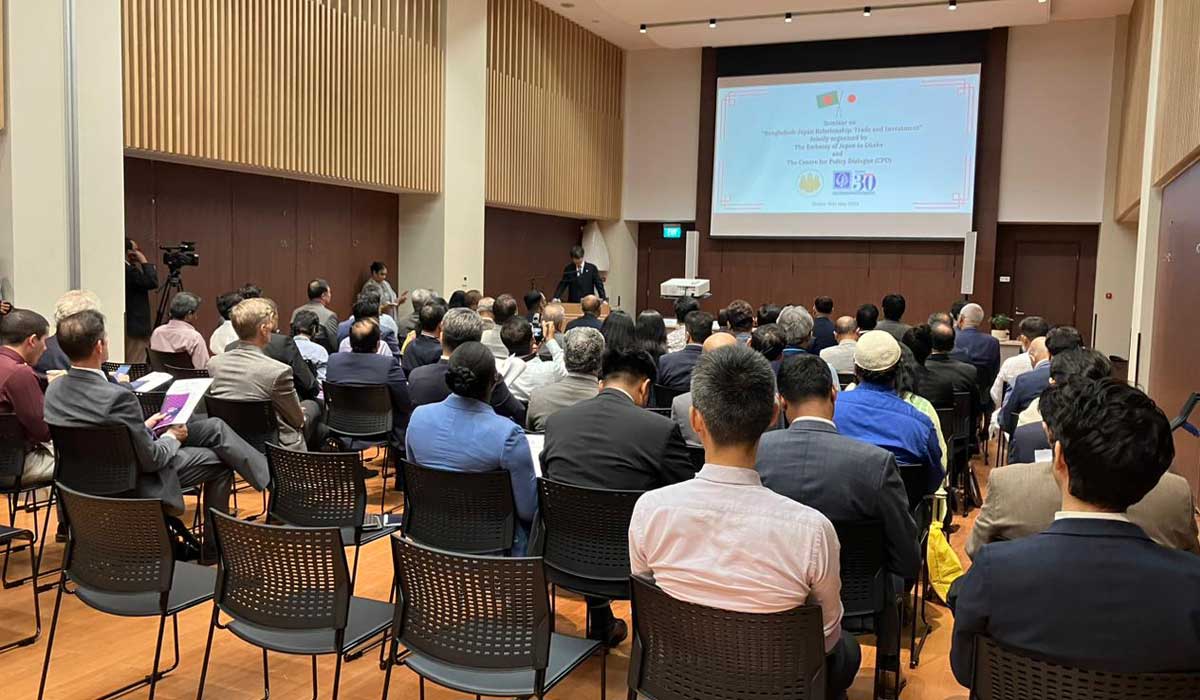
The panel session was followed by an intriguing open-floor discussion. High-level policymakers, diplomats, foreign delegates, researchers, development practitioners, academics, business leaders, civil society representatives, international development partners, and journalists participated in the seminar.

